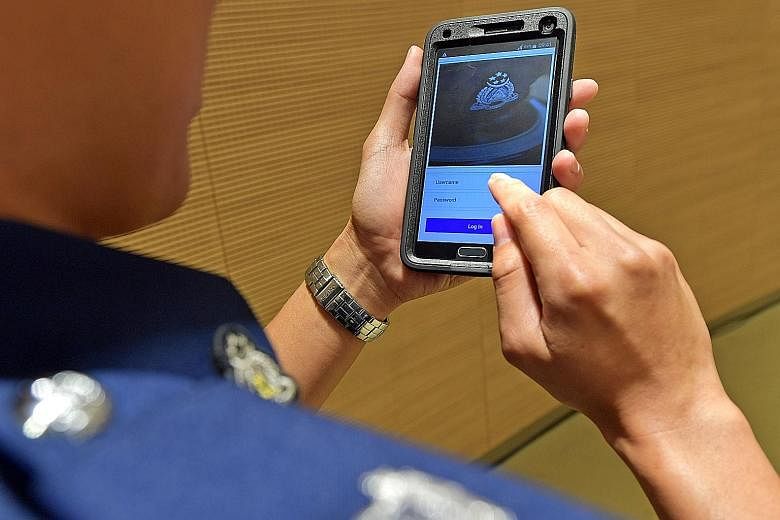Running "prisons without guards" could become a reality in the future, with the Singapore Prison Service (SPS) yesterday outlining various initiatives to leverage technology in its daily operations.
It includes providing prison officers on duty with mobile devices to access inmates' data at a glance.
The mobile Prison Operations and Rehabilitation Systems (Ports), which was rolled out in September last year, together with an upgraded prison-management system, can capture information and pictures on the go.
SPS and the Singapore Corporation of Rehabilitative Enterprises (Score) unveiled the road map for tech-savvy and data-driven prisons at the annual workplan yesterday.
In his opening speech, Minister for Home Affairs and Law K. Shanmugam said: "One of the themes Prisons is thinking of is 'Prisons Without Guards'."
He told some 350 staff at the Singapore Expo: "In a lot of places, the use of technology, such as RFID, means you don't need prison officers to be watching or physically being around the prisoners all the time. This will really help our officers free up their time to do other things, and this will help with the manpower crunch."
-
Three technology initiatives unveiled
-
MOBILE DEVICES
The mobile Prison Operations and Rehabilitation Systems (Ports) devices are used by prison officers to access inmates' data and capture information on the go. They are part of an enhanced prison management system rolled out in September last year.
DIGITAL REHABILITATION RECORDS MANAGEMENT SYSTEM
Using near field communications (NFC) technology, it is able to track inmates' attendance at work, counselling and rehabilitation programmes. This is done via an NFC chip embedded in the inmates' wrist tags.MILLIMETRE WAVE
BODY SCANNER The scanner is able to screen and detect hidden or contraband items on inmates using low power millimetre wave radio frequency technology. It reduces the reliance on physical searches.
Ng Huiwen
Speaking to reporters before the event, SPS' director of transformation and technology division Koh Tong Hai said freeing officers from guard duties will enable their work to extend to "higher-order jobs", like engaging inmates in rehabilitation.
These officers, who will receive relevant training in new skills, will be able to analyse data using technology to better tailor rehabilitation efforts to inmates' needs and risks.
Two initiatives in the pipeline are a system to track inmates' attendance at prison programmes, and a body scanner.
The first is the Digital Rehabilitation Records Management System, which tracks attendance records at work, counselling and rehabilitation programmes, all through a chip embedded in an inmate's wrist tag.
SPS is targeting to roll it out to other prisons next year after the pilot at the Changi Prison Complex.
The second initiative is the use of the millimetre wave body scanner, which is able to screen and detect hidden or contraband items under inmates' clothing. It will be tested at Changi Women's Prison this year.
SPS said that it will reduce the reliance on physical searches.
Besides these initiatives, Mr Shanmugam also highlighted an ongoing trial in the prison school at Tanah Merah Prison to allow inmates to use mobile tablets.


